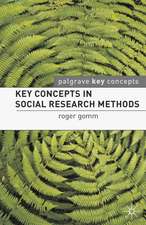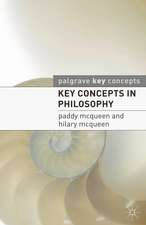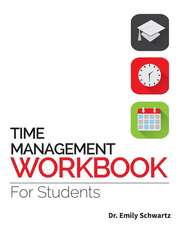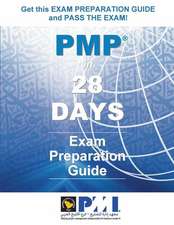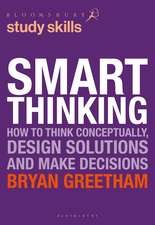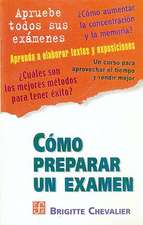How to Write Your Undergraduate Dissertation: Bloomsbury Study Skills
Autor Bryan Greethamen Limba Engleză Paperback – 18 mar 2019
Din seria Bloomsbury Study Skills
- 8%
 Preț: 113.15 lei
Preț: 113.15 lei - 5%
 Preț: 113.19 lei
Preț: 113.19 lei -
 Preț: 131.34 lei
Preț: 131.34 lei -
 Preț: 146.94 lei
Preț: 146.94 lei - 13%
 Preț: 121.58 lei
Preț: 121.58 lei - 21%
 Preț: 125.30 lei
Preț: 125.30 lei - 6%
 Preț: 138.03 lei
Preț: 138.03 lei - 7%
 Preț: 109.89 lei
Preț: 109.89 lei - 7%
 Preț: 157.16 lei
Preț: 157.16 lei - 14%
 Preț: 198.74 lei
Preț: 198.74 lei - 13%
 Preț: 127.84 lei
Preț: 127.84 lei - 13%
 Preț: 154.50 lei
Preț: 154.50 lei - 8%
 Preț: 197.14 lei
Preț: 197.14 lei - 6%
 Preț: 123.97 lei
Preț: 123.97 lei - 6%
 Preț: 132.56 lei
Preț: 132.56 lei -
 Preț: 114.22 lei
Preț: 114.22 lei - 8%
 Preț: 114.04 lei
Preț: 114.04 lei - 7%
 Preț: 135.20 lei
Preț: 135.20 lei - 6%
 Preț: 118.92 lei
Preț: 118.92 lei - 18%
 Preț: 120.41 lei
Preț: 120.41 lei - 19%
 Preț: 125.00 lei
Preț: 125.00 lei - 13%
 Preț: 189.38 lei
Preț: 189.38 lei - 14%
 Preț: 112.72 lei
Preț: 112.72 lei - 13%
 Preț: 106.77 lei
Preț: 106.77 lei - 14%
 Preț: 154.42 lei
Preț: 154.42 lei - 14%
 Preț: 165.91 lei
Preț: 165.91 lei - 8%
 Preț: 131.83 lei
Preț: 131.83 lei - 7%
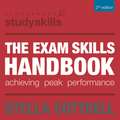 Preț: 149.90 lei
Preț: 149.90 lei - 12%
 Preț: 123.45 lei
Preț: 123.45 lei - 18%
 Preț: 133.61 lei
Preț: 133.61 lei -
 Preț: 131.73 lei
Preț: 131.73 lei -
 Preț: 166.58 lei
Preț: 166.58 lei - 7%
 Preț: 114.92 lei
Preț: 114.92 lei - 6%
 Preț: 123.97 lei
Preț: 123.97 lei - 13%
 Preț: 115.38 lei
Preț: 115.38 lei - 13%
 Preț: 115.84 lei
Preț: 115.84 lei - 8%
 Preț: 112.27 lei
Preț: 112.27 lei - 14%
 Preț: 120.87 lei
Preț: 120.87 lei -
 Preț: 234.89 lei
Preț: 234.89 lei - 7%
 Preț: 129.00 lei
Preț: 129.00 lei - 7%
 Preț: 162.20 lei
Preț: 162.20 lei - 14%
 Preț: 184.21 lei
Preț: 184.21 lei - 7%
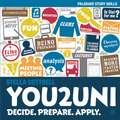 Preț: 157.62 lei
Preț: 157.62 lei -
 Preț: 108.78 lei
Preț: 108.78 lei -
 Preț: 154.33 lei
Preț: 154.33 lei -
 Preț: 167.87 lei
Preț: 167.87 lei - 13%
 Preț: 106.61 lei
Preț: 106.61 lei
Preț: 120.71 lei
Preț vechi: 127.23 lei
-5% Nou
Puncte Express: 181
Preț estimativ în valută:
23.10€ • 24.07$ • 19.12£
23.10€ • 24.07$ • 19.12£
Carte disponibilă
Livrare economică 13-27 martie
Livrare express 26 februarie-04 martie pentru 42.65 lei
Preluare comenzi: 021 569.72.76
Specificații
ISBN-13: 9781352005226
ISBN-10: 1352005220
Pagini: 384
Ilustrații: 44 bw illus
Dimensiuni: 156 x 234 x 15 mm
Greutate: 0.64 kg
Ediția:3rd ed. 2019
Editura: Bloomsbury Publishing
Colecția Bloomsbury Academic
Seria Bloomsbury Study Skills
Locul publicării:London, United Kingdom
ISBN-10: 1352005220
Pagini: 384
Ilustrații: 44 bw illus
Dimensiuni: 156 x 234 x 15 mm
Greutate: 0.64 kg
Ediția:3rd ed. 2019
Editura: Bloomsbury Publishing
Colecția Bloomsbury Academic
Seria Bloomsbury Study Skills
Locul publicării:London, United Kingdom
Caracteristici
Has a companion website with interactive resources, downloadable checklists and additional material
Notă biografică
Bryan Greetham was educated at the universities of Kent and Sussex, UK. He holds a PhD in moral philosophy from the University of Newcastle, Australia. He is currently engaged in research into moral thinking and the Holocaust, and teaches philosophy at the University of Maryland. He is the author of How to Write Better Essays, Thinking Skills for Professionals and Philosophy.
Cuprins
Acknowledgements Introduction PART I: EXAMINERS AND SUPERVISORS 1. Examiners - What Are They Looking For? 2. Working With Your Supervisor PART II: GENERATING AND DEVELOPING ORIGINAL IDEAS 3. What Activities Suit You Best? 4. Types of Research 5. What Interests You Most? 6. Generating Your Own Ideas 1: Using Trigger Questions 7. Generating Your Own Ideas 2: Perspectives and Levels 8. Developing Your Ideas 1: Causal Relations 9. Developing Your Ideas 2: Conceptual Relations 10. Original Questions and Hypotheses 1: Using Analogies 11. Original Questions and Hypotheses 2: Working With Your Structures PART III: DECIDING ON YOUR PROJECT 12. Searching the Literature 1: Knowing What to Look For 13. Searching the Literature 2: How to Search 14. Choosing the Topic 1: Feasibility 15. Choosing the Topic 2: Ethical Issues PART IV: ORGANISING YOUR WORK 16. Planning Your Research 17. Managing Your Time 18. Your Retrieval System 19. Reading 20. Note-taking PART V: DOING YOUR RESEARCH 21. Qualitative and Quantitative Research 22. Secondary Sources 23. Primary Sources 1: Quantitative Research 24. Primary Sources 2: Designing and Distributing Your Questionnaire 25. Primary Sources 3: Qualitative Research - Interviews and Focus Groups 26. Primary Sources 4: Qualitative Research - Case Studies and Observations PART VI: PLANNING YOUR DISSERTATION 27. The Main Components and Introduction 28. The Literature Review 29. Research Methods, Findings, Conclusions and Appendices PART VII: ORGANISING YOUR THINKING 30. Developing Consistent Arguments 1: The Components 31. Developing Consistent Arguments 2: The Connections 32. Using Evidence 1: Describing It 33. Using Evidence 2: Drawing Inferences 34. Using Evidence 3: Creating Causal Connections 35. Using Language 1: Clarity Jargon 36. Using Language 2: Clarity Manipulative Words 37. Using Language 3: Consistency PART VIII: WRITING YOUR DISSERTATION 38. The First Draft 39. Style 1: Finding Your Own Voice 40. Style 2: Simplicity and Economy PART IX: PLAGIARISM, REFERENCING AND BIBLIOGRAPHIES 41. Plagiarism 42. Referencing and Bibliographies PART X: EDITING 43. Revision 1: The Structure 44. Revision 2: The Content PART XI: PRESENTING YOUR WORK 45. Oral Presentations 46. Poster Presentations Conclusion Bibliography Index.


